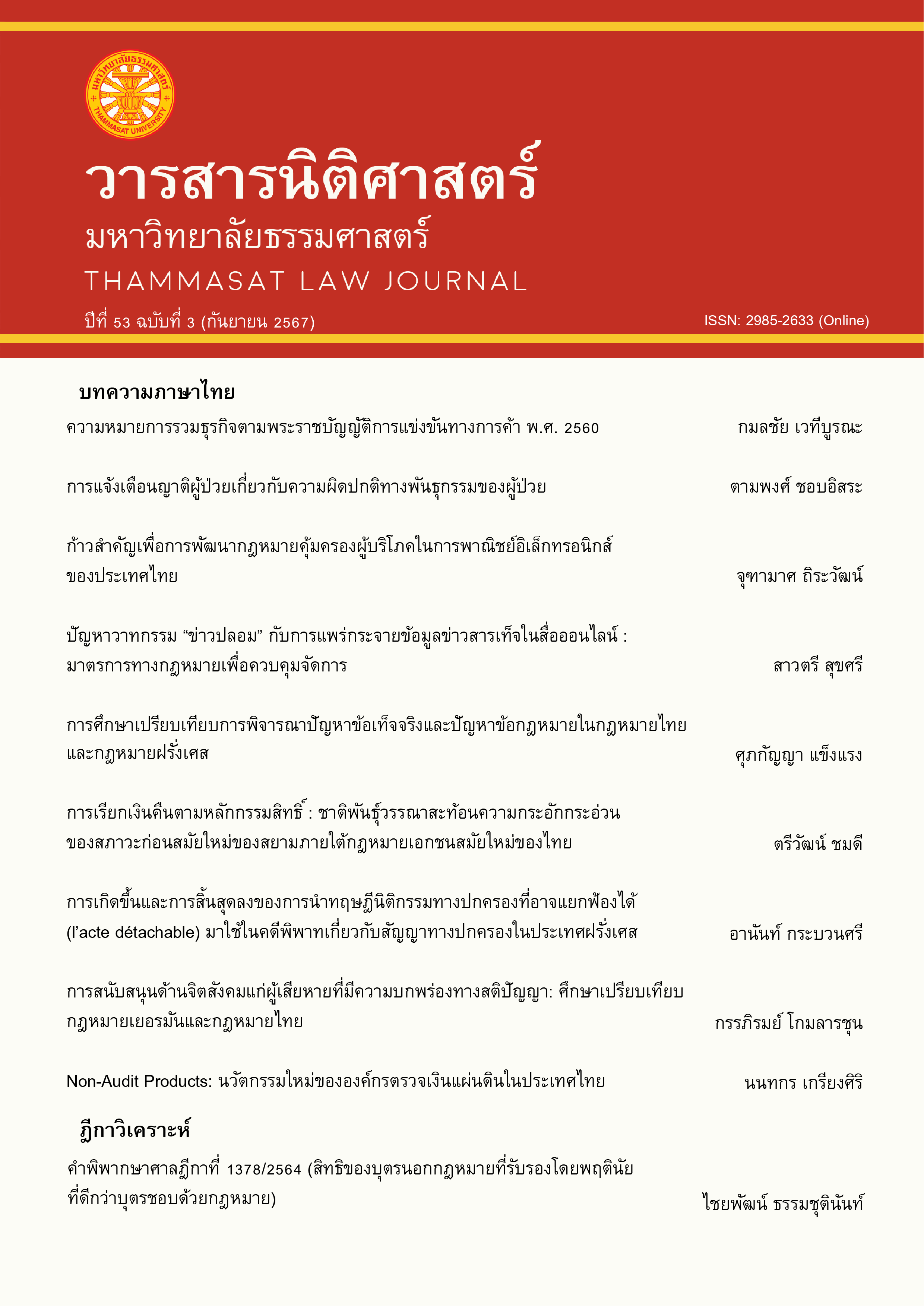การแจ้งเตือนญาติผู้ป่วยเกี่ยวกับความผิดปกติทางพันธุกรรมของผู้ป่วย
คำสำคัญ:
ข้อมูลทางพันธุกรรม, การรักษาความลับ, ความผิดปกติทางพันธุกรรม, หน้าที่ในการแจ้งเตือน, ความเป็นส่วนตัวทางพันธุกรรม, ญาติผู้ป่วยบทคัดย่อ
บทความนี้เขียนขึ้นเพื่อตีพิมพ์เผยแพร่รายงานการวิจัยที่กล่าวถึงข้อยกเว้นของหน้าที่ในการรักษาความลับสำหรับข้อมูลเกี่ยวกับความผิดปกติทางพันธุกรรมของผู้ป่วย โดยปกติแล้ว ข้อมูลเหล่านี้ไม่ควรถูกเปิดเผยเพื่อรักษาความเป็นส่วนตัวและป้องกันการตีตราผู้ป่วย หรือถูกเปิดเผยก็ต่อเมื่อผู้ป่วยให้ความยินยอม อย่างไรก็ตาม เนื่องจากข้อมูลทางพันธุกรรมของผู้ป่วยเชื่อมโยงกับผู้ที่มีความสัมพันธ์ทางสายโลหิตกับผู้ป่วย ข้อมูลเหล่านี้จึงสามารถบ่งบอกถึงความเสี่ยงที่ญาติผู้ป่วยจะมีความผิดปกติทางพันธุกรรม ในมุมหนึ่ง การนำข้อมูลเหล่านี้ไปแจ้งเตือนญาติผู้ป่วยอาจเป็นประโยชน์ต่อญาติผู้ป่วย โดยเฉพาะในกรณีที่มีมาตรการในการป้องกันหรือบรรเทาอาการของความผิดปกตินั้น แต่ในทางกลับกัน การแจ้งเตือนในลักษณะนี้นอกจากจะรุกล้ำความเป็นส่วนตัวของผู้ป่วยแล้ว ยังอาจส่งผลกระทบทางลบต่อญาติผู้ป่วยด้วย โดยเฉพาะในกรณีที่ญาติผู้ป่วยไม่ต้องการรู้หรือไม่มีมาตรการในการรับมือกับความผิดปกตินั้น จึงเกิดคำถามว่า การแจ้งเตือนในลักษณะนี้ควรเกิดขึ้นหรือไม่หากผู้ป่วยมิได้ให้ความยินยอม การแจ้งเตือนในลักษณะนี้ควรเกิดขึ้นภายใต้เงื่อนไขอะไร และกฎหมายควรมีบทบาทในเรื่องนี้หรือไม่ คำถามสำคัญของงานวิจัยฉบับนี้ คือ กฎเกณฑ์สำหรับการแจ้งเตือนญาติผู้ป่วยเกี่ยวกับความผิดปกติทางพันธุกรรมของผู้ป่วยควรมีลักษณะอย่างไรในประเทศไทย
บทความนี้นำเนื้อหาส่วนใหญ่ของรายงานการวิจัยฉบับนี้มานำเสนอ โดยเลือกหัวข้อที่ผู้เขียนเห็นว่ามีประโยชน์สำหรับผู้อ่านในวงกว้างและสามารถนำไปประยุกต์ใช้ในทางปฏิบัติ บทความนี้แบ่งออกเป็น 3 ส่วน ส่วนแรกอธิบายข้อพิจารณาที่มักถูกนำมาใช้เพื่อตัดสินใจในการแจ้งเตือนญาติผู้ป่วยเกี่ยวกับความผิดปกติทางพันธุกรรมของผู้ป่วย ส่วนที่สองอธิบายกฎเกณฑ์ในเรื่องนี้ของต่างประเทศ โดยนำเสนอกฎเกณฑ์ทางกฎหมายของสหรัฐอเมริกา สหราชอาณาจักร ประเทศออสเตรเลีย และประเทศฝรั่งเศส ส่วนสุดท้ายกล่าวถึงข้อเสนอของงานวิจัยฉบับนี้ โดยอธิบายว่ากฎเกณฑ์ในเรื่องนี้ควรมีลักษณะอย่างไรจึงเหมาะสมสำหรับประเทศไทย
ส่วนสุดท้ายของบทความนี้อธิบายว่า สำหรับประเทศไทย การรักษาความสัมพันธ์ระหว่างแพทย์และผู้ป่วยมีความสำคัญ กฎเกณฑ์ในเรื่องนี้จึงควรอยู่บนพื้นฐานของการให้ความเคารพต่อผู้ป่วยด้วยการกำหนดให้ผู้ป่วยเป็นผู้ตัดสินใจว่าจะมีการแจ้งเตือนญาติผู้ป่วยหรือไม่ แต่มีข้อยกเว้นว่า หากประโยชน์ที่ผู้ป่วยได้รับจากการแจ้งเตือนมีน้ำหนักมากกว่าการให้ความเคารพต่อผู้ป่วย การแจ้งเตือนญาติผู้ป่วยก็อาจเกิดขึ้นโดยปราศจากความยินยอมของผู้ป่วย จากแนวคิดพื้นฐานข้างต้น งานวิจัยฉบับนี้เสนอแนะว่ากฎเกณฑ์ของประเทศไทยควรกำหนดหน้าที่ทางกฎหมาย 3 ส่วน ส่วนแรกคือหน้าที่ในการบอกกล่าวผู้ป่วยก่อนที่ผู้ป่วยจะเข้ารับการทดสอบทางพันธุกรรมเกี่ยวกับความเป็นไปได้ของการแจ้งเตือนญาติผู้ป่วย ส่วนที่สองคือหน้าที่ในการสนับสนุนให้ผู้ป่วยแจ้งเตือนญาติผู้ป่วยด้วยตนเอง เมื่อหน้าที่ทางกฎหมายในการแจ้งเตือนยังมิได้เกิดขึ้นแต่การแจ้งเตือนเป็นประโยชน์สำหรับญาติผู้ป่วย ส่วนสุดท้ายคือหน้าที่ในการแจ้งเตือนญาติผู้ป่วย ซึ่งเกิดขึ้นเมื่อประโยชน์ที่ญาติผู้ป่วยได้รับจากการแจ้งเตือนมีมากและชัดเจนจนมีน้ำหนักมากกว่าผลกระทบทางลบที่เกิดจากการแจ้งเตือน
เอกสารอ้างอิง
หนังสือ
• G Laurie, Genetic Privacy: A Challenge to Medico-Legal Norms (Cambridge University Press 2002).
• GT Laurie, SHE Harmon and G Porter, Mason & McCall Smith's Law & Medical Ethics (10th edn, Oxford University Press 2016).
• TL Beauchamp and JF Childress, Principles of Biomedical Ethics (8th edn, Oxford University Press 2019).
บทความทางวิชาการ
• B Derbez and others, 'Familial Disclosure by Genetic Healthcare Professionals: A Useful but Sparingly Used Legal Provision in France' (2019) 45 Journal of Medical Ethics 811.
• C Mitchell and others, 'A Duty To Warn Relatives in Clinical Genetics: Arguably 'Fair just and reasonable' in English Law?' (2016) 32 Tottel's Journal of Professional Negligence 120.
• CH Leenen and others, 'Genetic Testing for Lynch Syndrome: Family Communication and Motivation' (2016) 15 Fam Cancer 63.
• ES Dove and others, 'Familial Genetic Risks: How Can We Better Navigate Patient Confidentiality and Appropriate Risk Disclosure to Relatives?' (2019) 45 Journal of Medical Ethics 504.
• G Laurie, 'Recognizing the Right Not to Know: Conceptual, Professional, and Legal Implications' (2014) 42 J Law Med Ethics 53.
• IM van der Steenstraten and others, 'Predictive Testing for Huntington Disease: Nonparticipants Compared with Participants in the Dutch Program' (1994) 55 American journal of human genetics 618.
• M Brazier, 'Do No Harm. Do Patients Have Responsibilities Too?' (2006) 65 The Cambridge Law Journal 397.
• M Gaille and others, 'The Ethics of Genomic Medicine: Redefining Values and Norms in the UK and France' (2021) 29 European Journal of Human Genetics 780.
คำพิพากษาของศาล
• คำวินิจฉัยประธานศาลอุทธรณ์ที่ 22/2552.
• ABC vs St George’s Healthcare NHS Trust and others [2015] EWHC 1394 (QB).
• ABC vs St George’s Healthcare NHS Trust and others [2017] EWCA Civ 336.
• ABC vs St George’s Healthcare NHS Trust and others [2020] EWHC 455 (QB).
• Caparo vs Dickman [1990] UKHL 2.
• Pate vs Threlkel, 661 So. 2d 278 (1995).
• Safer vs Estate of Pack, 677 A.2d 1188 (N.J. Super. Ct. App. Div. 1996).
เอกสารอื่น ๆ
• ตามพงศ์ ชอบอิสระ, 'การแจ้งเตือนญาติผู้ป่วยเกี่ยวกับความผิดปกติทางพันธุกรรมของผู้ป่วย' (งานวิจัยเสนอต่อคณะกรรมการส่งเสริมงานวิจัย คณะนิติศาสตร์ มหาวิทยาลัยธรรมศาสตร์, 2566).
• A Lucassen, J Montgomery and M Parker, 'Annual Report of the Chief Medical Officer: Chapter 16 Ethics and the Social Contract for Genomics in the NHS' 2017).
• Australian NHMRC, 'Use and Disclosure of Genetic Information to a Patient’s Genetic Relatives under Section 95AA of the Privacy Act 1988 (Cth)' (Guidelines for Health Practitioners in the Private Sector, March 2014).
• NIH: National Library of Medicine, 'Genetic Testing: What Is Informed Consent?' (MedlinePlus, 28 June 2021) <https://medlineplus.gov/genetics/understanding/testing/informedconsent/> สืบค้นเมื่อ 10 มิถุนายน 2566.
• Office of the Australian Information Commissioners, 'OAIC Guide to Health Privacy' (Australian Government, September 2019) <https://www.oaic.gov.au/privacy/guidance-and-advice/guide-to-health-privacy/chapter-8-using-and-disclosing-genetic-information-in-the-case-of-a-serious-threat> สืบค้นเมื่อ 21 พฤษภาคม 2565.
• P Mills and J Miller, 'Why We Need a New Social Contract for Data in Healthcare' (World Economic Forum: Health and Healthcare, 21 March 2019) <https://www.weforum.org/agenda/2019/03/why-we-need-a-new-social-contract-for-data-in-healthcare/> สืบค้นเมื่อ 30 มิถุนายน 2566.
• PM Alfred and OK Sam, 'Disclosure of Genetic Information as Matter of Medical Ethics and Patient Rights: The Relevant Legal Context' (2022) 19 Journal of US-China Medical Science <http://www.davidpublisher.com/index.php/Home/Article/index?id=47035.html> สืบค้นเมื่อ 20 มกราคม 2566.
• S Suter, 'Legal Challenges in Genetics, Including Duty to Warn and Genetic Discrimination' (2020) <https://www.ncbi.nlm.nih.gov/pubmed/31548231> สืบค้นเมื่อ 1 เมษายน 2566.
• UK General Medical Council, 'Confidentiality: Good Practice in Handling Patient Information' (2018).
• US Department of Health and Human Services, 'Federal Register' (25 January 2013) <https://www.govinfo.gov/content/pkg/FR-2013-01-25/pdf/2013-01073.pdf> สืบค้นเมื่อ 10 มกราคม 2567.
• US Department of Health and Human Services, 'When Does the Privacy Rule Allow Covered Entities to Disclose Protected Health information to Law Enforcement Officials?' (28 December 2022) <https://www.hhs.gov/hipaa/for-professionals/faq/505/what-does-the-privacy-rule-allow-covered-entities-to-disclose-to-law-enforcement-officials/index.html> สืบค้นเมื่อ 10 มกราคม 2567.
ดาวน์โหลด
เผยแพร่แล้ว
ฉบับ
ประเภทบทความ
สัญญาอนุญาต
ลิขสิทธิ์ (c) 2024 วารสารนิติศาสตร์ มหาวิทยาลัยธรรมศาสตร์

อนุญาตภายใต้เงื่อนไข Creative Commons Attribution-NonCommercial-NoDerivatives 4.0 International License.
ผลงานที่ตีพิมพ์ในวารสารนิติศาสตร์เป็นลิขสิทธิ์ของวารสารนิติศาสตร์ มหาวิทยาลัยธรรมศาสตร์ และวารสารนิติศาสตร์ มหาวิทยาลัยธรรมศาสตร์ สงวนสิทธิในการเผยแพร่ผลงานที่ตีพิมพ์ในแบบรูปเล่มและทางสื่ออิเล็กทรอนิกส์อื่นใด
บทความหรือข้อความคิดเห็นใด ๆ ที่ปรากฏในวารสารนิติศาสตร์เป็นความรับผิดชอบของผู้เขียนโดยเฉพาะ คณะนิติศาสตร์ มหาวิทยาลัยธรรมศาสตร์ และบรรณาธิการไม่จําเป็นต้องเห็นด้วยหรือร่วมรับผิดชอบใด ๆ



